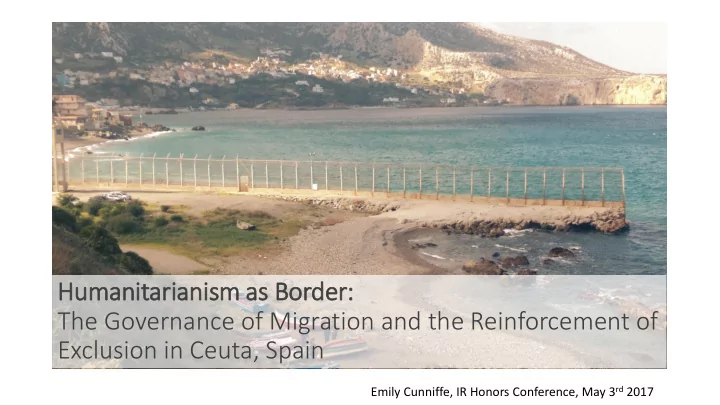

Humanitarianism as Border: The Governance of Migration and the Reinforcement of Exclusion in Ceuta, Spain Emily Cunniffe, IR Honors Conference, May 3 rd 2017
Research Puzzle and Research Questions What explains humanitarianism in the borderlands? What impact does it have on the undocumented migrants it targets?
Theoretical Context Border Studies Studies on Humanitarianism Critical Border and (Fassin; Ticktin; Agier) Migration Studies Humanitarian Borders (Walters, 2011)
Theoretical Contribution and Argument - Humanitarian border complex : State and non-state actors - Humanitarianism serves as an extension of border functions - Migration governance through humanitarianism and the borderlands as a migrant sorting center - Location in the state’s “order of things” - Politics of humanitarianism
Migration and Humanitarianism Today 2015 Why are these analyses important to raise today? Migration, crisis, and the securitization of borders Rise of humanitarianism and the concept of a universal humanity
Research Design: The Case Study Method The Case of Ceuta Case of intrinsic importance and resembles current policy concerns 1. One of only two land borders between Europe and the African Continent 2. Two sets of borders: fence with Morocco and sea with mainland Spain 3. Relation to the Europe Union’s border regime - Hungary 4. A nexus of migration, borders, and humanitarianism
Migration and Demographics in Ceuta 2408 Migrant arrivals in 2016 20,000-30,000 Daily crossings of the border 85,000 Population of Ceuta
Ceuta’s Border 1415 – Ceuta conquered by the Portuguese 1975 – Western Sahara Morocco 1986 – Spain joins the European Union 1991 – Spain signs Schengen Agreement 1993 – Construction on Ceuta’s border begins 1999 – Completion of Ceuta’s border 2005 – Border strengthened, 1000 personnel stationed on Spanish side of border. 2014 – Legalization of Summary Returns ( devoluciones en caliente) December 2016 – Biggest border jump since 2005
Research Design: Methods - Mixed-method and micro-level approach - Fieldwork in Summer 2016 and January 2017 - Participant observation in activity center in Ceuta - 14 interviews with government officials, members of NGOS, journalists, and activists - Policy and Legal Analysis (Spain and EU) - Time frame: 1985 – January 2017 Micro-level analysis of the mechanisms, causes, and impacts of (1) state humanitarianism (2) non-state humanitarianism
Findings: Mechanisms of State Humanitarianism Humanitarian Governance of Migration (1) Legibility - Documentation and Laws - Asylum and Laissez-passer Tarjeta Roja for Asylum Seekers (photo with permission) - Temporal Component - Categorizations of migrants (2) Access to Reception Center (CETI) provisions - medical attention, Spanish classes, food, accommodation Center for the Temporary Stay of Immigrants (CETI)
“And what happens when you don’t have papers? What happens?... Life is not a game. Three years of a life of a person are not a game. Here in Ceuta they are playing with our lives. We don’t have the right to work; we don’t have the right to a normal life. They think everything is alright, we have the CETI after all, we have food, a place to sleep. We receive clothes. And we receive the magical tarjeta roja . But, now what ?” - Hicham*, World Refugee Day (21 June 2016), Ceuta
Findings: Reasons for and Impacts of State Humanitarianism 1. Extension of the border into the borderlands • Controlling Mobility • Differential Inclusion 2. Ceuta as a migrant sorting center • Lives put on hold and legal liminality 3. Politics of humanitarianism
Findings: Non-State Humanitarianism of Red Cross - Mechanisms: Rescues at border through emergency medical response - “Emergency imaginary” - Reasons: Neutrality and the universal human; Relieving suffering. - Impacts: Relationship with Spanish state actors and contribution to the humanitarianization of borders; the de-politicization of migration,
Findings: Humanitarianism of Activity Centers - Mechanisms: Spanish classes and integration; Awareness campaigns; Provision of sanctuary. - Reasons: religion, societal bridge, migrant inclusion, interlocking tensions - Impacts: de-politicization of migration, new articulations of humanitarian borders
Conclusions Humanitarian Border Complex 1. The borderlands as a space of confinement and a migrant sorting center 2. Marginality and exclusion are defined and rearticulated through mechanisms of humanitarianism 3. The inextricability of borders and humanitarianism
Implications and Future Research What does this mean with regard to scholarship and in practice? • Theoretical implications: multiple actors, contextualized • Practical Implications: humanitarianism as policy reform, Lampedusa, Hungary • Future Research: politics of inclusion, Spain, EU, and Morocco relation
Recommend
More recommend